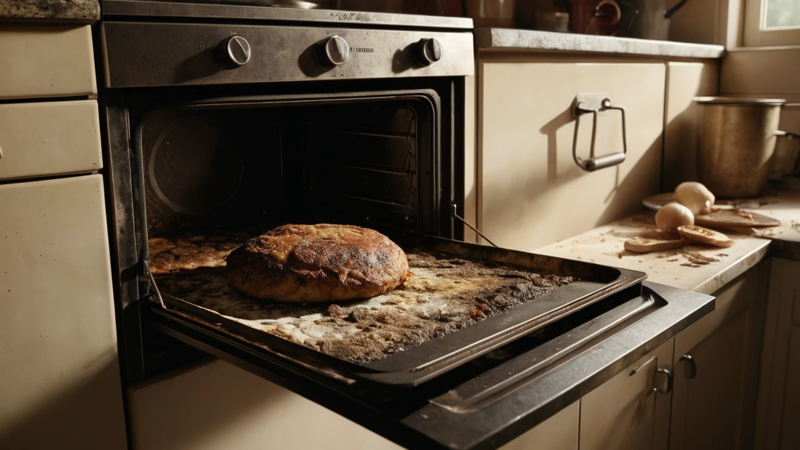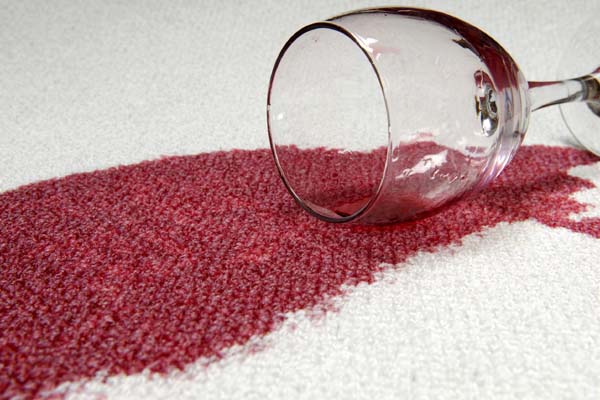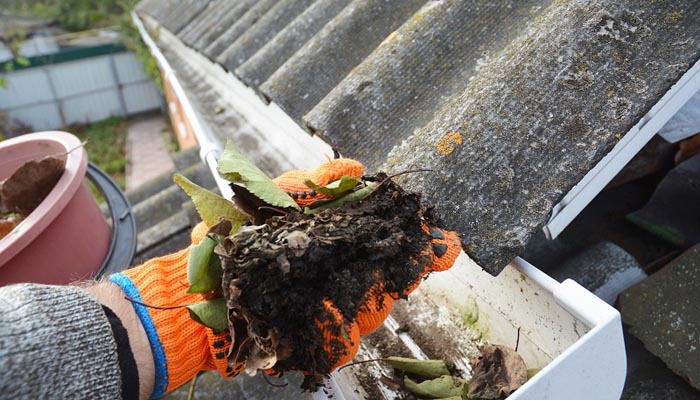The Hidden Dangers of Dirty Ovens can lead to health risks, fires, and costly repairs. Learn safe, easy, and natural ways to keep your oven clean.
Dirty ovens can cause hidden dangers like food contamination, fire hazards, and reduced efficiency. Regular cleaning with natural methods prevents bacteria buildup, improves cooking performance, and keeps your kitchen safe, healthy, and running smoothly.
Maybe your oven is sporting a few splatters, a bit of char, or some mysterious smudges on the glass, but it’s nothing serious, right? Well, what you think is just ‘wear and tear’ could actually mean more trouble than you bargained for.
If you’re curious, keep reading to know more about these dangers and learn some down-to-earth tips to keep your kitchen running like clockwork.
Table of Contents
Health Risks
Your oven might look harmless, but underneath the grime, it’s playing host to a party you definitely didn’t approve of.
Grease, crumbs, and burnt-on bits make the perfect hideout for bacteria like E. coli and Salmonella. So, while you’re making dinner, your oven could be serving up a side of food poisoning.
A lot of people assume high temperatures kill everything off. However, when grime builds up, it creates pockets that heat can’t reach.
Also, burnt-on food and grease release smoke, bad smells, and even airborne irritants when heated, which isn’t the kind of seasoning you want in your food. For anyone with allergies, asthma, or just a sensitive nose, this can turn their kitchen into a smoky nightmare.
That’s why you should clean your unit every now and then. You don’t need to bleach the place or drench your whole kitchen in chemicals. Just wipe up spills when they happen and give your oven a proper scrub every so often.
Your oven will look better, but more importantly, your food will be safer as well.
Fire Hazards
It only takes a few splatters for your oven to double as flammable kindling. If you crank up the heat, all that build-up can turn into an actual fire risk quicker than you’d think.
Believe it or not, one in every two house fires in Australia starts in the kitchen. So, what can you do? To keep these fire risks at bay, clean your oven at least once every week or two, scrubbing off leftover grease and food bits.
And while you’re at it, double-check that your smoke alarm is working and keep a fire extinguisher nearby just in case. Hopefully, you’ll never need it, but if that small splatter turns into flames, it’ll be your best bet.
Reduced Efficiency
If you feel like your oven has been a bit sluggish lately, it’s probably not your imagination.
When grime builds up on the walls and heating elements, it blocks airflow and traps heat in all the wrong places. That means uneven cooking and meals that don’t come out quite right.
If your food is cooking slower than usual or preheating takes longer than it used to, it’s probably time to clean things up. Trust us, it’s a simple maintenance habit that will save you time, money, and the frustration of wondering why your lasagne is still cold in the middle.
Pest Infestations
Ovens may be hot when in use, but the rest of the time, they’re warm, dark, and full of snacks, especially if you haven’t cleaned in a while.
Crumbs, grease drips, and hidden spills create the perfect environment for cockroaches, ants, and even mice to move in and start a colony. Once they settle in your oven, it’s only a matter of time before they explore the rest of your kitchen.
Even if you’re the cleanest cook in the world, one chicken spill can be enough to invite those unwanted guests.
Repair Costs
Sure, ignoring that burnt cheese puddle might not feel like a big deal in the moment, but over time, baked-on grease and food spills can start causing real damage.
As we’ve mentioned, grime buildup can block the vents and heating elements, leading to strain on the system. That strain causes parts to work harder, which means they’re more likely to wear out or overheat.
And if the mess spreads to electrical components, you’ll be looking at a callout fee plus a hefty bill just to get it working again. You might also end up replacing the entire unit years before you planned to.
So, why risk it? You don’t need to scrub your oven spotless every day, but staying on top of the grime will help you avoid big-ticket surprises down the line.
Fast and Budget-Friendly Fixes for Dirty Ovens
Nobody likes wasting precious hours scrubbing away at burnt-on gunk. The good news is that a handful of crafty shortcuts will help you make your oven gleam without endless elbow grease or a big budget.
Self-Cleaning Feature
If you have a self-cleaning oven, count yourself lucky. This feature blasts everything with high heat, turning food bits to ash.
Just switch it on and put your feet up while it does its thing. It’ll take a few hours, but you won’t have to lift a finger.
Natural Cleaners
If you’d rather skip the harsh chemicals and that telltale chemical stench, natural options can do the job just as well without the fumes. They’re cheap, gentler on the planet, and surprisingly effective against built-up dirt.
For a sparkling clean oven, mix 1/2 a cup of baking soda with enough water to make a paste. Then, smear it all over your oven and leave it overnight.
Next morning, spray some lemon juice or vinegar over the paste, and watch it bubble as it breaks down the dirt. Finally, wipe off all surfaces with a damp cloth, and enjoy that showroom shine.
Overnight Soak for the Trays and Racks
Cleaning your oven’s racks and trays doesn’t have to involve steel wool and sore arms. Instead, soak them overnight in your bathtub or sink with hot water and dish soap. By morning, you’ll be able to wipe off the grime easily, no scrubbing required.
Just make sure they’re completely dry before putting them back to avoid watermarks and rust.
Professional Services
Don’t want to spend hours elbow-deep in grease? Oven and BBQ cleaning services exist for this exact reason. These providers have the tools, products, and know-how to get the job done properly, often in under an hour.
It’s a solid option if you’re short on time or want a proper reset without doing the heavy lifting yourself.
Conclusion
You don’t need to wait for a small fireball or an odd mechanical rattle to realise that your oven is crying for help.
So, give it a little attention now, and it’ll pay you back with glorious, smoke-free bakes. Honestly, it’s the kind of upgrade that doesn’t even require a trip to Bunnings.
❓ FAQs
- What are the health risks of a dirty oven?
A dirty oven can harbor bacteria like E. coli and Salmonella, contaminating your food. Burnt residue releases smoke and irritants that can worsen allergies. Regular cleaning keeps your meals safe and your kitchen air fresh. - How often should I clean my oven for safety?
Ideally, clean your oven every 1–2 weeks, or right after major spills. This prevents grime buildup, reduces fire risk, and improves performance. Consistent upkeep also extends your oven’s lifespan. - Can I use natural cleaners for my oven?
Yes! A mix of baking soda and vinegar or lemon juice works wonders. These natural cleaners break down grease effectively without releasing harsh fumes or damaging surfaces. - What are signs my oven needs cleaning?
If your oven smokes, smells strange, or cooks unevenly, it’s time to clean. Visible grime, sticky residue, or slow preheating are also clear warnings. Don’t wait—cleaning now saves bigger issues later. - How does a dirty oven affect energy use?
Grime buildup makes your oven work harder to maintain temperature. This increases energy use, slows cooking, and strains heating parts. Keeping it clean helps your oven run efficiently and saves on utility bills.






Leave a Reply